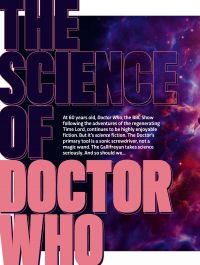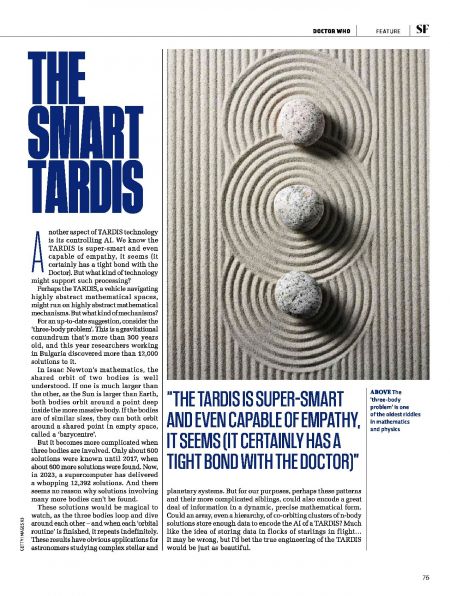The Smart Tardis
- Publication: BBC Science Focus
- Date: Nov. 2023
- Author:
- Page: 75
- Language: English
Another aspect of TARDIS technology is its controlling AI. We know the TARDIS is super-smart and even capable of empathy, it seems (it certainly has a tight bond with the Doctor). But what kind of technology might support such processing?
Perhaps the TARDIS, a vehicle navigating highly abstract mathematical spaces, might run on highly abstract mathematical mechanisms. But what kind of mechanisms?
For an up-to-date suggestion, consider the 'three-body problem'. This is a gravitational conundrum that's more than 300 years old, and this year researchers working in Bulgaria discovered more than 12,000 solutions to it.
In Isaac Newton's mathematics, the shared orbit of two bodies is well understood. If one is much larger than the other, as the Sun is larger than Earth, both bodies orbit around a point deep inside the more massive body. If the bodies are of similar sizes, they can both orbit around a shared point in empty space, called a 'barycentre'.
But it becomes more complicated when three bodies are involved. Only about 600 solutions were known until 2017, when about 600 more solutions were found. Now, in 2023, a supercomputer has delivered a whopping 12,392 solutions. And there seems no reason why solutions involving many more bodies can't be found.
These solutions would be magical to watch, as the three bodies loop and dive around each other — and when each 'orbital routine' is finished, it repeats indefinitely. These results have obvious applications for astronomers studying complex stellar and planetary systems. But for our purposes, perhaps these patterns and their more complicated siblings, could also encode a great deal of information in a dynamic, precise mathematical form. Could an array, even a hierarchy, of co-orbiting clusters of n-body solutions store enough data to encode the AI of a TARDIS? Much like the idea of storing data in flocks of starlings in flight... It may be wrong, but I'd bet the true engineering of the TARDIS would be just as beautiful.
Caption: ABOVE The 'three-body problem' is one of the oldest riddles in mathematics and physics
Disclaimer: These citations are created on-the-fly using primitive parsing techniques. You should double-check all citations. Send feedback to whovian@cuttingsarchive.org
- APA 6th ed.: (Nov. 2023). The Smart Tardis. BBC Science Focus p. 75.
- MLA 7th ed.: "The Smart Tardis." BBC Science Focus [add city] Nov. 2023, 75. Print.
- Chicago 15th ed.: "The Smart Tardis." BBC Science Focus, edition, sec., Nov. 2023
- Turabian: "The Smart Tardis." BBC Science Focus, Nov. 2023, section, 75 edition.
- Wikipedia (this article): <ref>{{cite news| title=The Smart Tardis | url=http://cuttingsarchive.org/index.php/The_Smart_Tardis | work=BBC Science Focus | pages=75 | date=Nov. 2023 | via=Doctor Who Cuttings Archive | accessdate=26 December 2025 }}</ref>
- Wikipedia (this page): <ref>{{cite web | title=The Smart Tardis | url=http://cuttingsarchive.org/index.php/The_Smart_Tardis | work=Doctor Who Cuttings Archive | accessdate=26 December 2025}}</ref>

